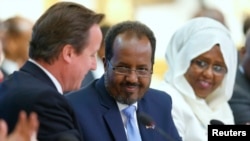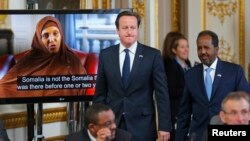Britain, the United States and other international donors have pledged more than $300 million to help Somalia, as the country rebuilds from two decades of chaos and war.
British Prime Minister David Cameron said his country will commit $15.5 million toward developing the Somali armed forces and $22.5 million to strengthen the police and train judges and lawyers.
He said support for Somalia is both urgent and necessary, warning that a failure to help Somalia will lead to more terrorism.
"Radicalism is poisoning young Somali minds and breeding terrorism and extremism," Cameron warned. " This is a threat to our security and if we ignore it we would be making the same mistakes in Somalia that we made in Afghanistan in the 1990s"
Somali President Hassan Sheikh Mohamud told the conference of more than 50 countries and organization in London Tuesday that his country faces challenges, but that Somalia can thrive after a period of international investment and support.
Story continues below photogallery
"We can not allow the immense progress we have made to be wasted and the world has to stand by our side to make sure that this would happen," he said. "We are starting to see signs of recovery and economic revival in Somalia. If we act now to receive the support from the international community the Somali government will definitely deliver the expectations of the Somali people and the international community as well."
He identified the militant group al-Shabab as one of the threats still facing the country.
Al-Shabab claimed responsibility for a suicide bombing that killed eight people in Mogadishu on Sunday.
The Somali ambassador to Britain, Abdullahi Mohamed Ali, told VOA's Somali Service that security is a top priority for the government but said militant attacks will likely continue.
"But definitely we’re not expecting these kinds of attacks to be eliminated, and to be out of the picture. This is going to be an unrealistic ambition," the ambassador said.
Tuesday's conference followed two international conferences held last year to support the country's move from a transitional government to a new parliament and elected president.
Also Tuesday, President Mohamud signed a joint communique with the United Nations on preventing sexual violence. The document calls for Somalia to strengthen laws against sexual violence, ensure access to medical, psychological and legal aid for victims, further protect those living in displaced persons camps and reinforce prohibitions against sexual violence among the military and police.
Somalia had gone more than 20 years without stable central government, since the ousting of president Mohamed Siad Barre in 1991.
African Union peacekeepers and militaries in the region have helped push al-Shabab out of major cities, but the militants have remained in control in areas of the south and still carry out sporadic attacks on the capital.
Britain opened a new embassy in Somalia last month. Turkey, Libya, Yemen and Iran also have embassies there.
British Prime Minister David Cameron said his country will commit $15.5 million toward developing the Somali armed forces and $22.5 million to strengthen the police and train judges and lawyers.
He said support for Somalia is both urgent and necessary, warning that a failure to help Somalia will lead to more terrorism.
"Radicalism is poisoning young Somali minds and breeding terrorism and extremism," Cameron warned. " This is a threat to our security and if we ignore it we would be making the same mistakes in Somalia that we made in Afghanistan in the 1990s"
Somali President Hassan Sheikh Mohamud told the conference of more than 50 countries and organization in London Tuesday that his country faces challenges, but that Somalia can thrive after a period of international investment and support.
Story continues below photogallery
"We can not allow the immense progress we have made to be wasted and the world has to stand by our side to make sure that this would happen," he said. "We are starting to see signs of recovery and economic revival in Somalia. If we act now to receive the support from the international community the Somali government will definitely deliver the expectations of the Somali people and the international community as well."
He identified the militant group al-Shabab as one of the threats still facing the country.
Al-Shabab claimed responsibility for a suicide bombing that killed eight people in Mogadishu on Sunday.
The Somali ambassador to Britain, Abdullahi Mohamed Ali, told VOA's Somali Service that security is a top priority for the government but said militant attacks will likely continue.
"But definitely we’re not expecting these kinds of attacks to be eliminated, and to be out of the picture. This is going to be an unrealistic ambition," the ambassador said.
Tuesday's conference followed two international conferences held last year to support the country's move from a transitional government to a new parliament and elected president.
Also Tuesday, President Mohamud signed a joint communique with the United Nations on preventing sexual violence. The document calls for Somalia to strengthen laws against sexual violence, ensure access to medical, psychological and legal aid for victims, further protect those living in displaced persons camps and reinforce prohibitions against sexual violence among the military and police.
Somalia had gone more than 20 years without stable central government, since the ousting of president Mohamed Siad Barre in 1991.
African Union peacekeepers and militaries in the region have helped push al-Shabab out of major cities, but the militants have remained in control in areas of the south and still carry out sporadic attacks on the capital.
Britain opened a new embassy in Somalia last month. Turkey, Libya, Yemen and Iran also have embassies there.






